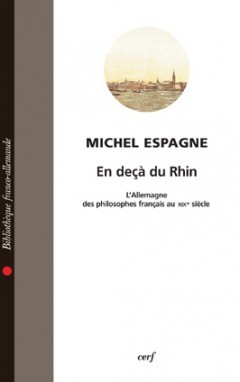La philosophie dite française, même si elle se prend à rêver aujourd'hui d'horizons transatlantiques, est dans la longue durée une affaire allemande. Mais il s'agit d'une Allemagne à usage interne, traduite, recomposée, adaptée, transformée. Les filiations et contextualisations patiemment élaborées modifient la nature de l'objet importé jusqu'à le recréer. L'université française du XIXe siècle, de la chute du premier Empire à la guerre de 1914, s'est passionnément vouée à l'appropriation et à l'acclimatation de la philosophie allemande, au point de donner à la discipline philosophique une identité mixte, hybride, caractéristique au plus haut point de ces espaces d'imbrication qu'une histoire culturelle de l'Europe se doit désormais de découvrir. Les apprentissages linguistiques, les voyages, les traductions, les thèses, les revues, les éditions spécialisées, les réseaux de correspondance sont autant de jalons souvent méconnus d'un des principaux transferts culturels de l'histoire contemporaine. -- The philosophy we refer to as French - even if today it dreams of transatlantic horizons - is, in the long term, a German affair. But the Germany in question has been adapted for home use, translated, recomposed, adjusted, transformed. The painstakingly-elaborated filiations and contextualisation have changed the nature of the imported matter to the point of recreation. 19th century French universities, between the fall of the First Empire and WW1, passionately devoted their efforts to the appropriation and the acclimatisation of German philosophy, to the extent of giving the discipline a hybrid identity so characteristic of the intersecting spaces that any future cultural history of Europe will be obliged to identify. Language learning, travelling, translation, theses, reviews, specialised publications, communication networks... they are all preparing the ground, often unknowingly, for one of the major cultural transfers of modern times.




